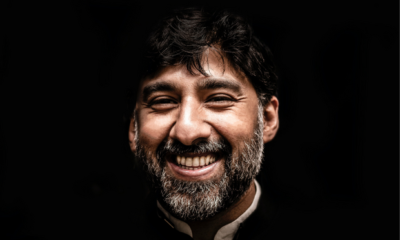Life
How to Appreciate Life and Not Just Exist in It

Do you sometimes stare off into space and wonder “Why am I here?” “What am I doing?” or “There has to be more to life than just this.” We get caught in the everyday routine of sleep, work, home, sleep, work, home, and…you get the point.
Since when do we become conditioned to settle for this way of life? Was it from our parents and their parents before them? Or is it from our environment that we have to accommodate in order to comply with the rules in place? I believe this way of life is called ‘existing.’ When we go through the motions of everyday life and fall into the routine, we don’t realize that there is another way of life, which is called ‘living.’
Few people understand the difference and very few people make the leap from existing to living. We don’t realize that there’s another way until we choose to recognize that there is. Usually, it’s shown to us by a mentor, teacher, elder, or a friend. When you choose to ‘live’ rather than ‘exist,’ you start to view your life on earth in a completely different perspective. It’s as if your mind opened and you are seeing your life with a new pair of glasses, never wanting to take them off.
I understood the power of ‘living’ when I saw a mentor in a webinar. The things discussed made sense to me and I wanted to learn more. This mentor was talking about creating experiences to enjoy life, surrounding yourself with rich and loving relationships, and being purposeful and intentional in everyday actions. I wondered “How do you start to live life that way? I want to do that.” I got to work and read anything I could about how to live life, not just exist in it.
“Although no one can go back and make a brand new start, anyone can start from now and make a brand new ending.” – Carl Bard
I came across three helpful tips that I use today to guide me in living life. Below, you can read about them:
1. Become mindful and present in every situation
This is a skill that is continuously worked on all the time! What does that exactly entail? It involves becoming aware of your own thoughts and what you say to yourself. We generate thousands of thoughts everyday and it’s impossible to be mindful of each and every one. You can be mindful over most of them though. Becoming mindful requires mental discipline and focus. It’s just like a muscle, it gets stronger with more practice.
Being present is also a challenge that requires mental discipline and focus. It’s being able to appreciate and acknowledge your surroundings, whether it’s eating a meal or sitting at a park or even being stuck in gridlock traffic.
Reminding yourself to be present in the moment brings to light the ‘living’ part of life. It’s the fall colors in the tree you saw in the park or it’s relishing each bite of your meal and the delicious flavors you’re tasting. It’s paying attention to the here and now.
2. Create experiences
I feel that a majority of people don’t take advantage of creating experiences in their lives. Sure, you take the annual family vacation 2 weeks out of the year but what about the other 50 weeks? What kinds of experiences do you create in the remaining 50?
Recently, I was listening to a mentor of mine and he shared that given a pool of money, it is best to use the money into creating experiences and adventures than to use it towards objects. The rationale behind this is because with objects, we create momentary happiness with that object. Happiness doesn’t last long.
When we use money towards creating experiences and adventures, we are left with the memories and the physical response to that adventure or experience. You can relive it again and again. It will continue to provide happiness. When was the last time you created an experience? Was it camping in the back yard with your kids? Or taking a cooking class with your friend? Or how about that weekend getaway with your partner and did everything spontaneously? Inject experiences into your life so that you can ‘live’ and see what’s out there. Create memories!
“The saddest summary of a life contains three descriptions: could have, might have, and should have.” – Louis E. Boone
3. Do more of what makes you happy
I’ll be honest. This is a really tough question for a lot of people to answer. “What makes you happy?” It’s as if there’s some unwritten rule or law about being happy. Like it’s forbidden or something.
It seems that once you become an adult, you’re not supposed to be happy or happiness is only meant for children. Or worse yet, happiness is temporary. Yes, there are times where we are facing unfortunate circumstances such as a divorce or perhaps you have just been given bad news regarding your health. There can be some bad things in the world. I don’t deny that. But the choice is how you want to feel regarding these circumstances. Even if you are in a horrible situation, there is absolutely something that can brighten your mood, even for a moment. Whether it’s reading a book or going for a walk or even talking to a friend.
When we become conscious and choose to do more things that bring us joy and happiness, we start to look at life a bit better. When we realize and notice what makes us happy, it’s up to us to make the intentional purpose of doing it often so that we can enjoy being happy. Regardless of if you’re 8 or 80, make sure to allow yourself to feel the emotion of joy and happiness.
I frequently utilize these three tips in my life, and it’s helped me see life in a new way. I’m more mindful of the people I’m interacting with, appreciate and express gratitude in everything I experience, and spoil myself with happiness because there’s nothing wrong with that. Isn’t it time you start ‘living’ and not ‘existing?’
What makes you the happiest in life? Share your thoughts and stories with us below!
Did You Know
How Skilled Migrants Are Building Successful Careers After Moving Countries
Behind every successful skilled migrant career is a mix of resilience, strategy, and navigating systems built for locals.

Moving to a new country for work is exciting, but it can also be unnerving. Skilled migrants leave behind familiar systems, networks, and support to pursue better job opportunities and a better future for their families. (more…)
Life
10 Research-Backed Steps to Create Real Change This New Year
This New Year could finally be the one where you break old patterns and create real, lasting change.

Every New Year, we make plans and set goals, but often repeat old patterns. (more…)
Life
9 Harsh Truths Every Young Man Must Face to Succeed in the Modern World
Before chasing success, every young man needs to face these 9 brutal realities shaping masculinity in the modern world.

Many young men today quietly battle depression, loneliness, and a sense of confusion about who they’re meant to be.
Some blame the lack of deep friendships or romantic relationships. Others feel lost in a digital world that often labels traditional masculinity as “toxic.”
But the truth is this: becoming a man in the modern age takes more than just surviving. It takes resilience, direction, and a willingness to grow even when no one’s watching.
Success doesn’t arrive by accident or luck. It’s built on discipline, sacrifice, and consistency.
Here are 9 harsh truths every young man should know if he wants to thrive, not just survive, in the digital age.
1. Never Use Your Illness as an Excuse
As Dr. Jordan B. Peterson often says, successful people don’t complain; they act.
Your illness, hardship, or struggle shouldn’t define your limits; it should define your motivation. Rest when you must, but always get back up and keep building your dreams. Motivation doesn’t appear magically. It comes after you take action.
Here are five key lessons I’ve learned from Dr. Peterson:
-
Learn to write clearly; clarity of thought makes you dangerous.
-
Read quality literature in your free time.
-
Nurture a strong relationship with your family.
-
Share your ideas publicly; your voice matters.
-
Become a “monster”, powerful, but disciplined enough to control it.
The best leaders and thinkers are grounded. They welcome criticism, adapt quickly, and keep moving forward no matter what.
2. You Can’t Please Everyone And That’s Okay
You don’t need a crowd of people to feel fulfilled. You need a few friends who genuinely accept you for who you are.
If your circle doesn’t bring out your best, it’s okay to walk away. Solitude can be a powerful teacher. It gives you space to understand what you truly want from life. Remember, successful men aren’t people-pleasers; they’re purpose-driven.
3. You Can Control the Process, Not the Outcome
Especially in creative work, writing, business, or content creation, you control effort, not results.
You might publish two articles a day, but you can’t dictate which one will go viral. Focus on mastery, not metrics. Many great writers toiled for years in obscurity before anyone noticed them. Rejection, criticism, and indifference are all part of the path.
The best creators focus on storytelling, not applause.
4. Rejection Is Never Personal
Rejection doesn’t mean you’re unworthy. It simply means your offer, idea, or timing didn’t align.
Every successful person has faced rejection repeatedly. What separates them is persistence and perspective. They see rejection as feedback, not failure. The faster you learn that truth, the faster you’ll grow.
5. Women Value Comfort and Security
Understanding women requires maturity and empathy.
Through books, lectures, and personal growth, I’ve learned that most women desire a man who is grounded, intelligent, confident, emotionally stable, and consistent. Some want humor, others intellect, but nearly all want to feel safe and supported.
Instead of chasing attention, work on self-improvement. Build competence and confidence, and the rest will follow naturally.
6. There’s No Such Thing as Failure, Only Lessons
A powerful lesson from Neuro-Linguistic Programming: failure only exists when you stop trying.
Every mistake brings data. Every setback builds wisdom. The most successful men aren’t fearless. They’ve simply learned to act despite fear.
Be proud of your scars. They’re proof you were brave enough to try.
7. Public Speaking Is an Art Form
Public speaking is one of the most valuable and underrated skills a man can master.
It’s not about perfection; it’s about connection. The best speakers tell stories, inspire confidence, and make people feel seen. They research deeply, speak honestly, and practice relentlessly.
If you can speak well, you can lead, sell, teach, and inspire. Start small, practice at work, in class, or even in front of a mirror, and watch your confidence skyrocket.
8. Teaching Is Leadership in Disguise
Great teachers are not just knowledgeable. They’re brave, compassionate, and disciplined.
Teaching forces you to articulate what you know, and in doing so, you master it at a deeper level. Whether you’re mentoring a peer, leading a team, or sharing insights online, teaching refines your purpose.
Lifelong learners become lifelong leaders.
9. Study Human Nature to Achieve Your Dreams
One of the toughest lessons to accept: most people are self-interested.
That’s not cynicism, it’s human nature. Understanding this helps you navigate relationships, business, and communication more effectively.
Everyone has a darker side, but successful people learn to channel theirs productively into discipline, creativity, and drive.
Psychology isn’t just theory; it’s a toolkit. Learn how people think, act, and decide, and you’ll know how to lead them, influence them, and even understand yourself better.
Final Thoughts
The digital age offers endless opportunities, but only to those who are willing to take responsibility, confront discomfort, and keep improving.
Becoming a man today means embracing the hard truths most avoid.
Because at the end of the day, success isn’t about luck. It’s about who you become when life tests you the most.
Change Your Mindset
The Four Types of Happiness: Which One Are You Living In?
Most people chase success only to find emptiness, this model reveals why true happiness lies somewhere else.

In a world driven by rapid technological growth and constant competition, many people unknowingly trade joy for achievement. (more…)
-

 Health & Fitness2 weeks ago
Health & Fitness2 weeks agoWhat Minimalism Actually Means for Your Wellness Choices
-

 News1 week ago
News1 week agoBrandon Willington Builds 7-Figure Business by Ignoring Almost Everything
-

 Did You Know2 weeks ago
Did You Know2 weeks agoWhy Most Online Courses Fail and How to Fix Them
-

 Business2 weeks ago
Business2 weeks agoIf Your Business Internet Keeps Letting You Down, Read This
-

 Business2 days ago
Business2 days agoEntrepreneur’s Guide to Pay Stubs: Why Freelancers and Small Business Owners Need a Smart Generator
-

 Finances3 hours ago
Finances3 hours agoWhy Financial Stress Is One of the Biggest Barriers to Personal Growth
-

 Business47 minutes ago
Business47 minutes agoThe Simple Security Stack Every Online Business Needs
























